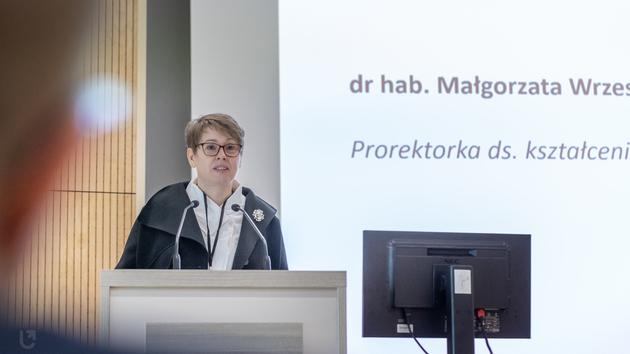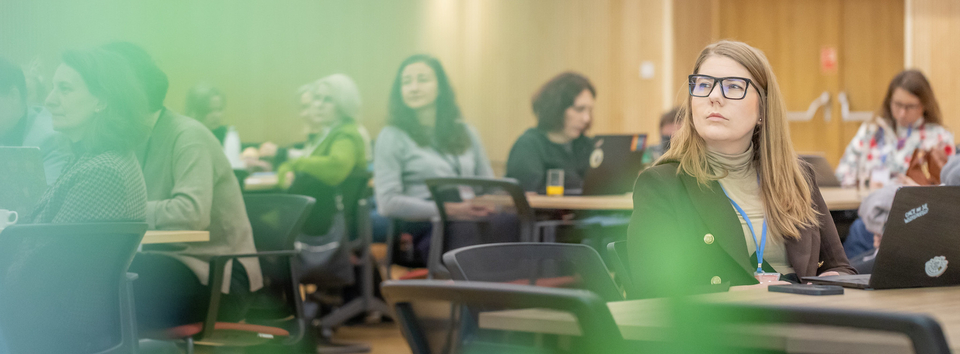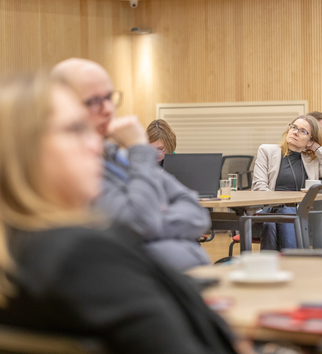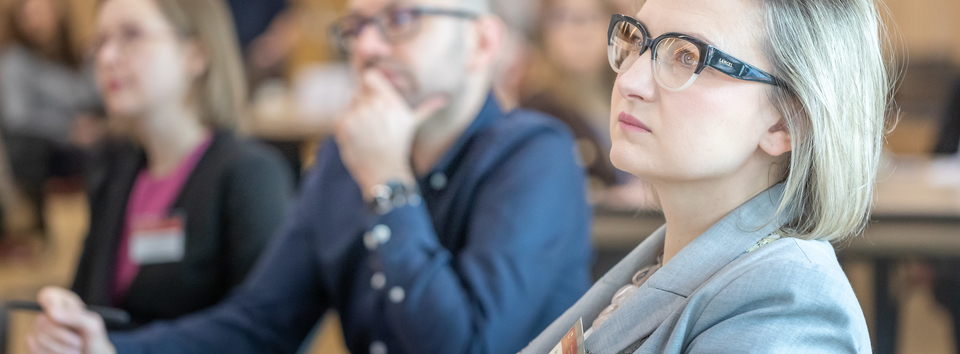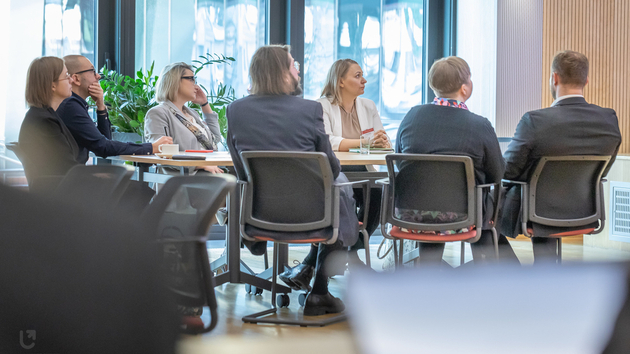The main objective of the meeting, which was also attended by dr hab. Małgorzata Wrzesień, Associate Professor at the University of Lodz, the University of Lodz Vice-Rector for Education, was to present the tutoring model implemented at our university and examples of good practices in implementing this form of education. The event participants had an opportunity to consider activities that could encourage students to participate in tutoring processes and lecturers to conduct them. Recently, thanks to training, the group of tutors at the university has increased by over 50 people. There are currently over a hundred of them.
Tutoring – a key tool for changing academic education
The seminar was attended by over 50 people: dean authorities, representatives of faculties responsible for teaching and other persons responsible for the educational process.
The issues of tutoring and the process of its implementation at the University of Lodz were introduced to the audience in short speeches by Dr Agata Matuszewska-Kubicz, the University of Lodz Coordinator for Tutoring, Prof. Małgorzata Wrzesień, the University of Lodz Vice-Rector, Dr Karolina Rudnicka, Associate Professor at the University of Lodz, Representative for Innovation and Implementation (Faculty of Biology and Environmental Protection), and mgr Marzena Bednarek-Kokosza, Deputy Director of the Education and Student Affairs Centre.
I believe that each of us has encountered a person or people on our educational path who have shaped us in a special way, who have significantly influenced where we are today. It is good for such people to be characterised by passion, willingness and patience in imparting knowledge, just like you gathered here. Our meeting today will be an opportunity to reflect on the direction in which contemporary academic education is heading, as well as on the role that tutoring plays in it. We live in times when education is more than just imparting knowledge: it must inspire, develop critical thinking and help students (because that is what we focus on today) discover their own paths of development. In this context, tutoring based on the master-student relationship plays the role of a key tool. Why tutoring? First of all, because young people with passion can benefit from it, and such people often later create science or make great careers in other sectors. We do not have to look far for examples, thanks to tutoring we already have a large group of talented doctoral students. It can be carried out as part of a study curriculum or outside of it. It is important that there is the widest possible range of staff who can undertake such classes and that changes to university regulations that allow for this form of instruction are effectively implemented
– said Prof. Małgorzata Wrzesień, the University of Lodz Vice-Rector for Education.
Tutoring according to practitioners and in practice
In the next, working part of the seminar, entitled “Wdrażanie tutoringu na UŁ – dobre praktyki”, [Implementation of tutoring at the University of Lodz – good practices ] the following persons talked about the introduction of this form of education (with the support of the Ministry of Education and Science) at the Faculty of Economics and Sociology of the University of Lodz: dr hab. Agnieszka Dziedziczak-Foltyn, Associate Professor at the University of Lodz, the faculty coordinator for tutoring, and mgr Piotr Statucki, mgr Olga Korczyńska, mgr Angelika Kapuścik, mgr Ksawery Olczyk – doctoral students at the University of Lodz Doctoral School of Social Sciences, tutoring participants.
Then, the seminar participants listened to the presentations "Tutoring w akcji – 10 godzin, różne tematy, indywidualne podejście" [Tutoring in action – 10 hours, various topics, individual approach] by Dr Joanna Ciesielska-Klikowska, tutoring coordinator at the University of Lodz Faculty of International and Political Studies, "Jak zacząć? Wdrażanie tutoringu poza programem studiów na przykładzie WNG" [How to start? Implementing tutoring outside the study curriculum using the example of the faculty of Geographical Sciences] by Dr Aleksandra Mroczek-Żulicka, tutoring coordinator at the University of Lodz Faculty of Geographical Sciences, and "Tutoring w programie studiów na przykładzie Wydziału Biologii i Ochrony Środowiska" [Tutoring in the study curriculum using the example of the Faculty of Biology and Environmental Protection] by Dr Anna Jasińska, tutoring coordinator at the University of Lodz Faculty of Biology and Environmental Protection.
The working part of the meeting concluded with a workshop led by dr hab. Agnieszka Dziedziczak-Foltyn, Associate Professor at the University of Lodz.
Tutoring, i.e. the goals of the master-student relationship
Tutoring is a form of education based on systematic and planned individual meetings between a student and an academic teacher (tutor). The purpose of tutoring is in particular to support the student in the area of:
- individual scientific or professional development,
- expanding the pool of knowledge and using it to formulate and solve complex and typical and/or atypical research problems in an innovative way,
- developing communication skills (verbal and written) on specialist topics with diverse audiences,
- shaping good academic attitudes and practices.
The purpose and topics of tutoring meetings are chosen by a student and may pertain to, for example, support in writing a diploma thesis or scientific article, preparation for a presentation at a scientific conference or the development of soft skills.
Detailed information on the implementation of tutoring at the University of Lodz (in Polish)
Source: Dr Agata Matuszewska-Kubicz and Press Office, University of Lodz
Edit: Press Office, University of Lodz
Photos: Maciej Andrzejewski (Centre for Brand Communications, University of Lodz)

